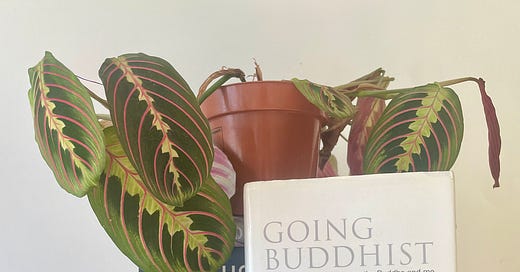Reading
Going Buddhist by Peter J Conradi - Iris Murdoch’s biographer is most charming when he veers away from his purported subject to rhapsodise about his true master:
She was my teacher always. The mixed sense of space and of claustrophobia recorded by students in the presence of certain Tibetan Buddhist teachers was, when I met them later, already familiar from being with her. Goodness in her novels is not the ordinary human condition but always the special case, and it is a curiosity of her own life-myth that her good characters are always separated-off, and sometimes cold. A good man - she thought - would combine love and justice in his view of others. But her good characters often unintentionally make others feel more judged than cared for. This is as true of her first novel, Under the Net, where Jake feels - quite falsely - rebuked by the good Hugo, as it is in her later The Sea, The Sea where Charles feels admonished by his cousin James, though the latter secretly loves him.
When a director wished to turn Under the Net into a film around 1985, she proposed “simplifying” the book’s philosophy by making it Buddhist. She had been reading about Buddhism since the 1940s, when she had planned in a novel (unpublished and lost) to incorporate the Dalai Lama.
Yellowface by RF Kuang - a wry fable about the loneliness and derangement of being a writer in the digital panopticon.
Demian by Hermann Hesse (reread prompted by John Pistelli). Now I stan Hesse as much as the next stoned fairy, but I found all the talk of self-actualisation a but much this time around. I liked best the bits that remind me of Rilke as much as of the Neech:
The life of everyone is a way to himself, the search for a road, the indication of a path. No man has yet attained to self-realization; yet he strives thereafter, one ploddingly, another with less effort, each as best he can. Each one carries the remains of his birth, slime and eggshells of a primeval world, with him to the end. Many a one will remain a frog, a lizard, an ant. Many a one is top-part man and bottom-part fish. But everyone is a projection of nature into manhood. To us all the same origin is common, our mothers - we all come out of the womb. But each of us, an experiment, one of nature’s litter, strives after his own ends. We can understand one another, but each one is able to explain only himself.
The Identity Trap by Yasha Mounk - a reasonable attempt at explicating the origins of woke politics, although, as Arnold Kling would say, this needn't have been a book, a Substack entry would have sufficed.
“America’s New Politics of Nothing” by Ryan Zickgraf (Compact Mag) aptly sums up the zeitgeist.
Freddie has been on fire lately on disability therapy culture and trauma - this is what he should be writing a book about!
Part III of John Pistelli’s serial novel for subscribers, Major Arcana, got off to a strong start.
Watching
Passages directed by Ira Sachs. A sexy and sad film about the vagaries of love.
Past Lives directed by Celine Song. Beautifully shot and acted, reminded me of the Before Sunrise trilogy.
The Wonderful Story of Henry Sugar directed by Wes Anderson (Netflix). More films should be 40 minutes long! I found the signature visual delights and metaphysical hijinks more effective within the tight structure of the short story than in the more sprawling Asteroid City (although Alan Jacobs has a good write-up of the latter).
Wobble Place directed by Eugene Kotlyarenko: quirky indie comedy starring Dasha. Depressingly, the anhedonic undertone still feels relevant.
Marina Abramović (Royal Academy of Arts, London) - a fine retrospective, although not as interactive as I would have liked.
I livestacked the Sexual Revolution debate (addendum: Aella making some sensible pro porn points)




